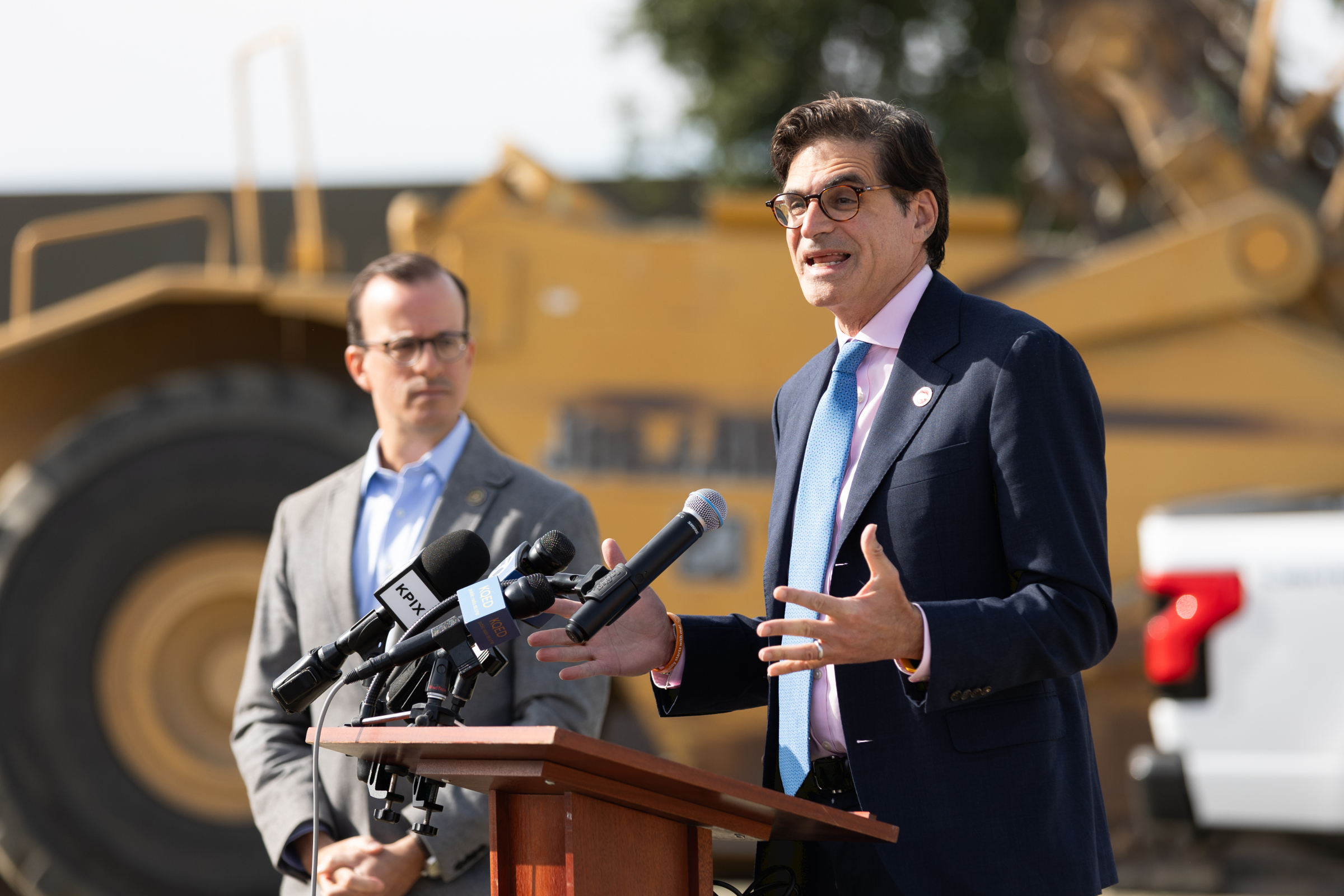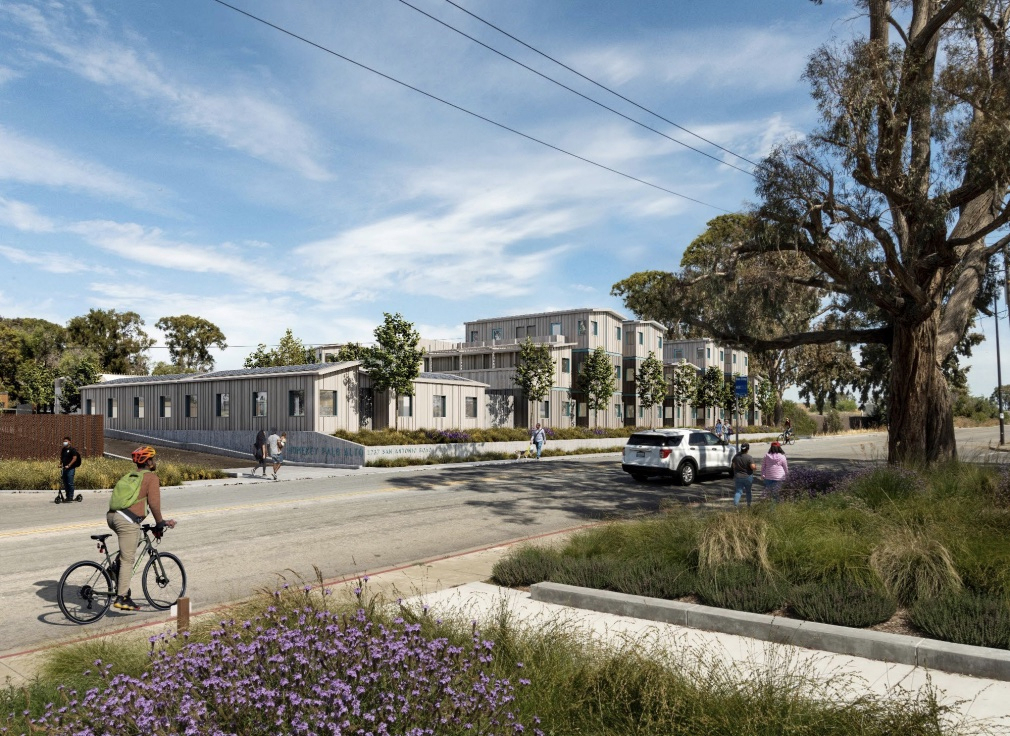As Palo Alto moves ahead with construction of a housing complex for homeless individuals in the Baylands, state Sen. Josh Becker is advancing a bill that he hopes will make these types of projects much more common across California.
His proposal, Senate Bill 634, builds on a 2019 law that created streamlining provision for construction of "low-barrier navigation centers," facilities that provide individuals with social services and transitional housing with the goal of ultimately moving them to permanent housing. The 2019 legislation, known as Assembly Bill 101, allows these types of buildings to be constructed in non-residential and mixed-use zones, provided they meet best practices such as allowing tenants to have partners, pets, possessions and privacy, according to a review from the Legislative Analyst's Office.
Becker's new bill expands the definition of eligible projects by creating a new category called "opportunity housing" that consists of modular units that can be affixed or removed relatively quickly. The legislation would apply to public or private land that cities or public agencies have determined to have no demonstrable use within the next five years.
If the bill is applied to a non-residential zone, the site would have to be located near amenities and services that assist people who are experiencing homelessness. Housing providers will also be required to provide a "housing transition" plan that details a process for relocating residents if the project needs to be moved because the parcel is no longer suitable for the development. This could include a process for moving people to another "opportunity housing" project or for connecting them to providers of permanent housing.
Becker told this publication that the bill was inspired by his tour of Mountain View's transitional-housing development at 2566 Leghorn St., which opened in May 2021. The development, which consists of prefabricated modular homes, is operated by LifeMoves, which is also taking charge of the Palo Alto project that is now being constructed at 1237 San Antonio Road.
While Becker's bill failed to advance through the recently concluded legislative session, Becker told this publication that he plans to bring it back in the next one.
"When I went to Mountain View and saw the first Homekey project, that's when the lightbulb went off," said Becker, referring to the state Homekey program that provides funding for transitional housing developments. "We can actually build these units, especially the modular and relocatable kind, in just six months."
The goal of the bill, he said, is to allow projects of this sort to get approved by right in areas where no other type development is likely to occur.
"If a county has a space, or a school district or Caltrans have spaces, and they won't use them for three to five years, we can put these units on," Becker said. "And if we need to move them in three to five years, we'll move them.
"There's no excuse for unsheltered homelessness in the state," he added. "We now know we can build these units, build them quickly and move them if we need to. There's no excuses."
While the idea of building transitional housing is generally popular, Becker saw some opposition to the bill last year, primarily from nonprofit groups and jurisdictions who believe that the legislation prioritizes transitional housing over the permanent type. Some critics, including those advocating for homeless individuals, requested amendments to clarify that this won't be the case.
Under the bill's current provisions, if a proponent of an opportunity project expresses an interest in a parcel, a local agency must respond within 60 days with a determination on whether the parcel has a demonstrable use within the next five years. If it does not and the local jurisdiction is not willing to negotiate a lease or license agreement with the project proponent, its response must include a justifiable reason for not leasing it.
Lobbyists for local jurisdictions expressed concerns during a public hearing earlier this year that the land-use provisions of the proposed bill. Jason Rhine, representing of League of California Cities, and Chris Lee, representing the Urban Counties of California and Rural Counties of California, suggested at the April 26 hearing these groups will oppose the bill unless it's amended.
"We think this is giving this model a more preferential treatment to any type of housing, including permanent housing," Lee said at the hearing of the Senate Governance and Finance Committee. "There's a lot of bills proceeding regarding the use of public lands, putting significant limitations on ability to lease lands without first offering them to permanent affordable housing developers."
Becker noted at that hearing that 67% of California's homeless people are unsheltered. The state has the highest rate of both homelessness and unsheltered homelessness in the country, he said. Some people are living in doorways just steps from the state Capitol, Becker said.
Elizabeth Funk, CEO of San Francisco-based nonprofit DignityMoves, a builder of transitional housing projects, testified in support of the bill. While cities try to build permanent housing, it's critical for the state to have fast, cost-effective and scalable solutions. She noted that her project in San Francisco, at 33 Gough St., was permitted in less than three weeks and residents were able to occupy the units within two months of the start of construction.
"As Californians, we know we desperately need permanent housing, but the cost to do that is so astronomical and takes so long, it's just not realistic to expect to get everyone indoors immediately, even if we had unlimited resources."
While the committee ultimately approved the bill 5-2, the legislation did not make it out of the committee process for a full vote in the last session. State Sen. Catherine Blakespear, who chairs the committee, encouraged those who oppose the bill to reconsider their position.
"We have a clear humanitarian crisis on the street," Blakespeare, D-Encinadas, said at the hearing. "We have encampments within the shadow of the capital. We have property that is available for short-term, mid-term, five-years-or-less housing. We should be utilizing it."




Comments
Registered user
Mayfield
on Nov 4, 2023 at 2:49 pm
Registered user
on Nov 4, 2023 at 2:49 pm
This is like the use of potable classrooms for our Cali school children . The portables are now permanent campus additions to our public school education facilities / environment, 40 years on . Third world solutions is not a solution but a forever stop gap.